|
Posted by Romy the Cat on
07-29-2018
|
My Placete preamp was sitting in Idaho for update for a
long time, so there was not a lot of audio activity lately. Also, the last few
month there was a lot of things going on in my life that severely compromised my
audio rotation. It is summer and small kids spend a lot of time outside that request
a lot if not my attention but at least presence. The property needed to be open
for summer business and there was a lot of work need to be done. The idiot-landscaper
destroyed grass at our lawn that required me to learn about the damn grass growing
and fix it. I undertook a large construction project in our home that required
a lot of planning and supervision, it is still going one and hopefully will be
over in a week or two. I fired one of my long term helper and another good long
term helper ended up in jail, so with a lot of property maintenance tasks I ended
up to involved much more then I would like to. Our nanny tenure is expired and
new one need to be acquired. I undertook a major transition from .Net to Golang
in my professional life. Amy’s parents moved right next to us, which is blessing
and curse. Amy and I decided to change to that dreadful “healthy life style”, whatever
bloody thing it is, but hopefully it will keep us available for each other and
to our kids slightly longer. I turn 50 years old in beginning of month, I can write
a fucking book how I feel about it! Anyhow, there was zillion other things that
made me kind of “busy” and there was not a lot of audio in my life during the
last few month.
Lately, I go my Placete back, the life looks straitening
up and a few last time I had a long listening session in my listening room I recognize
that I was so much missing these listening experiences. The playback is a good shape, the extra 6dB
from Placete made is even better. The way how I left playback before was a
“smart” setting in my view. The playback do not go too low in term of overall balance,
it has solid mid 30Hz, but it has also no “shit bass” when typically “wrong
means” are used to squeeze bass out of wrong and bass-impotent topologies. The lack of bass is not so notable in my current
playback. In fact the bass is quite good
in my estimation. What is missing is the last feeling of “weight”, the very specific
softness that usually introduced with sub 20Hz response, the softness that warms
the whole sonic presentation and make is so fucking palpable! I had in in my formal listening rooms, I call
it ULF cannel (Ultra Low Frequency) and I do not have it in my current listening
room. Here is how it was done in my last listening room:
https://www.goodsoundclub.com/Forums/ShowPost.aspx?postID=14457
When I said that that I left my playback in “smart setting” I meant that
I did not go for ULF by wrong means. You cannot get any proper ULF by bumping room
with LF distortions that come for a running a regular commercial subwoofer. You
cannot put a large Sunfire-like topology with tweaked electronics in use. Well,
you can and you will get the right SPL numbers under 20 but it will be sound
that satisfy only your SPL meter but not you spirit.
So, with this post I am starting to collect my thoughts
about the ULF for my new listening room and hopefully as a result, I will have
it implemented.
Rgs, Romy the Cat
|
|
|
|
Posted by rowuk on
07-29-2018
|
Romy,
you have often advocated the ULF channel not having a sharp lower knee. Maybe something like the Thigpen rotary woofer with response to DC would be worth considering.
|
|
|
|
Posted by Romy the Cat on
07-29-2018
|
All thinking about ULF are usually centered on 3 subjects:
drivers, topology and amplification. Even though these 3 subsets very much intertwined
I still would like to talk about it separately. We do presume that we have the proper
drivers for proper topology with proper amplification. When wrong type of
driver used for a given topology or wrong amplification applied then there is truly
noting to talk…
The absolute majority of ULF solutions out there today are different
variations of ported enclosures. It is know that I hate any ported bass, including
is super expensive implementations. Still, in most of the cases implying bass I
am taking about auditable bass that always to my taste has some foreign vowels in
it. It is a valid presumption that is a ULF channel is crossed under 20Hz then
the auditable port accent might not be heard. Years back Wilson Audio made the XS
model with two 18” in a ported configuration that meant to run under the large
Grand Slamms. That would be sub 20Hz setting and it something that might be aligned
with what I am looking. Still, the large ported implementation similar XS takes
a very large box and I do not want to invest my listening room with such a monstrosity.
Also, I need to admit that I have no skills to make a ported
design to sound better. Sure I can load the T/S in spreadsheet and circulate
the necessary detention and to invest money into better peripherals but my hunch
suggests me that it is not how good sound archived. I do not see myself to
dedicate much efforts to learn about ported design decisions and its sonic consequences.
Well, there is direction to buy a ready to go bass sections,
so call subwoofers. Here is the problem. There is practically no products out
there that might be used for ULF application. Most subwoofers meant to be used
for auditable range. Let to look at the good commercial subwoofers. JBL for instance
use to have a very good driver 2245H with resonance frequency 20Hz, QMS 2.2 and
BL21. You can makes a very good sounding ported subwoofer with it serving very
nice 30 or 40Hz. As you driving it harder or go lower in a larger room then with
xMax 9 mm it is not so useful. JBL replaced 2245H with modern version 2269H, it
has FS 28Hz more BL and xMax at sub 20mm. You can drive this beast much harder
and JBL made number of new LB section around the driver: MD7, Sub18 and a few
others. All of them are ported at low 20Hz and they can handle “some” power abuse
at transition slope. This type of solution is also big and I would need to be
very careful to enter an auditable range as the Fs is to close.
The seals enclosure are foe sure the kind in my view but
having 10-20dB lower out at RS you need a lot of drivers to get some SLP and
VERY large box to avoid problem in case internal volume compression kick in.
The horns also out if picture foe me. It might be a good
idea to go for midrange horn and use my current LF section for midbass but I do
not have in me stamina to unleash myself on another Midbass horn project.
There is a direction
that I am looking now – the Infinite Baffle (IB). It was almost a cream de la cream topology, superbly
hard to implement and very had to implement. The funny part is that my new listening
room almost made foe IB. I have a very cool second sealing above my listening
room and I am considering to put IB in there. With IB drivers need to be able
to handle high exertion and a lot of power. I have in my storage 8 Aura 1808
drivers. They are 96dB sensitive, tunes for 25Hz and under 18mm Xmax, the most important
is that 1808 undehung! So, I am considering to put 2-4 per channel, in IB
configuration, loaded into an open triangle. There are some other options. The AeSpeakers
have cool driver IB18HT. It is not underhang but with Apollo update it might be
useful. It tuned for 18Hz, 18mm eversion, slightly less BL and less sensitivity.
I will be exploring more IB options during the ways and
weeks to come…
|
|
|
|
Posted by Paul S on
07-31-2018
|
The AE cited is said to be "designed for IB". Since one does not "use the box" or a vent, etc. to jack up IB LF, it's going to be all about moving the 250g Mms through the usual, steep, ULF filter. Maybe a notch filter or anti resonance filter at 19 Hz? Any readers out there running one of the AE IB woofers?
Paul S
|
|
|
|
Posted by Romy the Cat on
08-01-2018
|
Are
any commentary from the folks who have done it before?
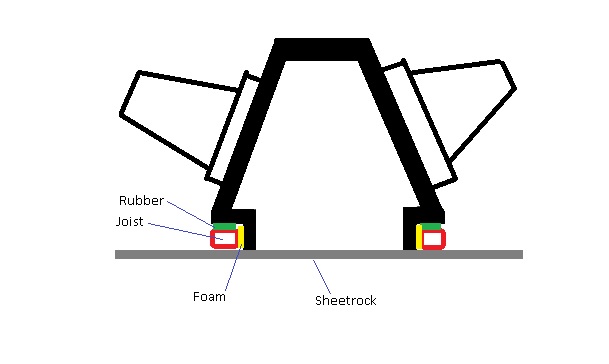
|
|
|
|
Posted by Romy the Cat on
08-01-2018
|
I engaged is a discussion about my IB project with some guys
who do IB for a while:
http://ibsubwoofers.proboards.com/ , the My Projects Section, I think you need
to login to get it…
What is interesting is that they claim that “rubber and foam
do nothing to decouple the manifold from the structure” because it will be “tremendous
amount of vibration from the sound waves”. I certainly respect what they advise
but it does sound not intuitive to me. I know that there are some builder at
this forum, what is your take on the subject?
|
|
|
|
Posted by Paul S on
08-01-2018
|
Romy, does the area behind the drivers open into a sort of attic space? If the parts of the structure are well fastened together, you get one major resonance. Depending on the driver behavior it is sometimes possible to "spread" the resonance around some. But at basically sub-sonic frequencies, expect the house to shake, according to what you're listening to.
Paul S
|
|
|
|
Posted by decoud on
08-02-2018
|
|
Low frequency damping is a huge problem in architecture, and that it is poorly solved tells you it is hard. Simplest improvement would be to use a viscoelastic material with better properties than rubber and to embed weights within it. Perhaps obtain a two inch thick sheet of Poron, fire lead shotgun pellets at it, and cut out your gaskets from the result.
|
|
|
|
Posted by rowuk on
08-02-2018
|
If one is using multiple in phase drivers, they are spread out over space and help reduce resonance by interference. Another possibility would be a B&W like lightweight matrix enclosure to move resonance UP, where it is more easily damped. A third possibility would be to mount the drivers in reverse and connect the chassis or magnets. This impulse compensation would dramatically reduce the transmission of energy to the structure!
http://members.aon.at/kinotechnik/diyaudio/dipol/space/impulse_compensation/Impulse_compensation.pdf
|
|
|
|
Posted by anthony on
08-02-2018
|
 Romy the Cat wrote: Romy the Cat wrote: | I engaged is a discussion about my IB project with some guys
who do IB for a while:
http://ibsubwoofers.proboards.com/ , the My Projects Section, I think you need
to login to get it…
What is interesting is that they claim that “rubber and foam
do nothing to decouple the manifold from the structure” because it will be “tremendous
amount of vibration from the sound waves”. I certainly respect what they advise
but it does sound not intuitive to me. I know that there are some builder at
this forum, what is your take on the subject?
|
|
I did not bother signing on to that forum to see your thread, but no foam is going to decouple 20Hz, not even close. Part of the design criteria of my my Bass Cannons project is to try to limit the transmission of low frequencies through the floor of my room down to the house below. Speaker cabinets at those frequencies do not attenuate the volume very much and even with my rather inert, damped, very rigid and pre-tensioned Cannons sound leaks through like water through a sieve. The transmission of sound causes vibrations in the cabinet walls which is then efficiently coupled to the floor which vibrates in sympathy which causes sound transmission to the rooms below. I looked at all kinds of ways to isolate these speaker vibrations from the floor, but in the end I used industrial pneumatic isolators similar to those you have in you Vibraplanes (but much less expensive). Part of the reason that I used those mounts is so that I can level the stack of Cannons, but there are other low frequency mounts that you may be able to use if levelling is not required.
Look for the resonant frequency of the mount (Fs) that is sufficiently below the frequency that you wish to isolate above. Multiply Fs by the 1.41 and that is the frequency from which the isolator will start isolating: so if Fs = 5Hz then isolation begins at 7.07Hz.
Have a look at these mounts. Note that they have specidfied a minimum and maximum load: to get best isolation you have to load them near their maximum (same with all of these mounts I will link you to). These are the pneumatic mounts that I used. Under the DSET power supplies I needed something that was relatively inexpensive but capable of isolating reasonably low frequencies so that I could keep floor vibrations out of the power supplies: I used these.
I hope this is of some use Romy.
|
|
|
|
Posted by N-set on
08-05-2018
|
As a practitioner of vibration decoupling (stacore.pl), I second the idea. No gel, foam, rubber, etc will work on ULF as high mass + pneumatic mounts do. Pref. pneumatic damped too. I can assist with the design of the suspension.
Cheers,
Jarek
|
|
|
|
Posted by Romy the Cat on
08-07-2018
|
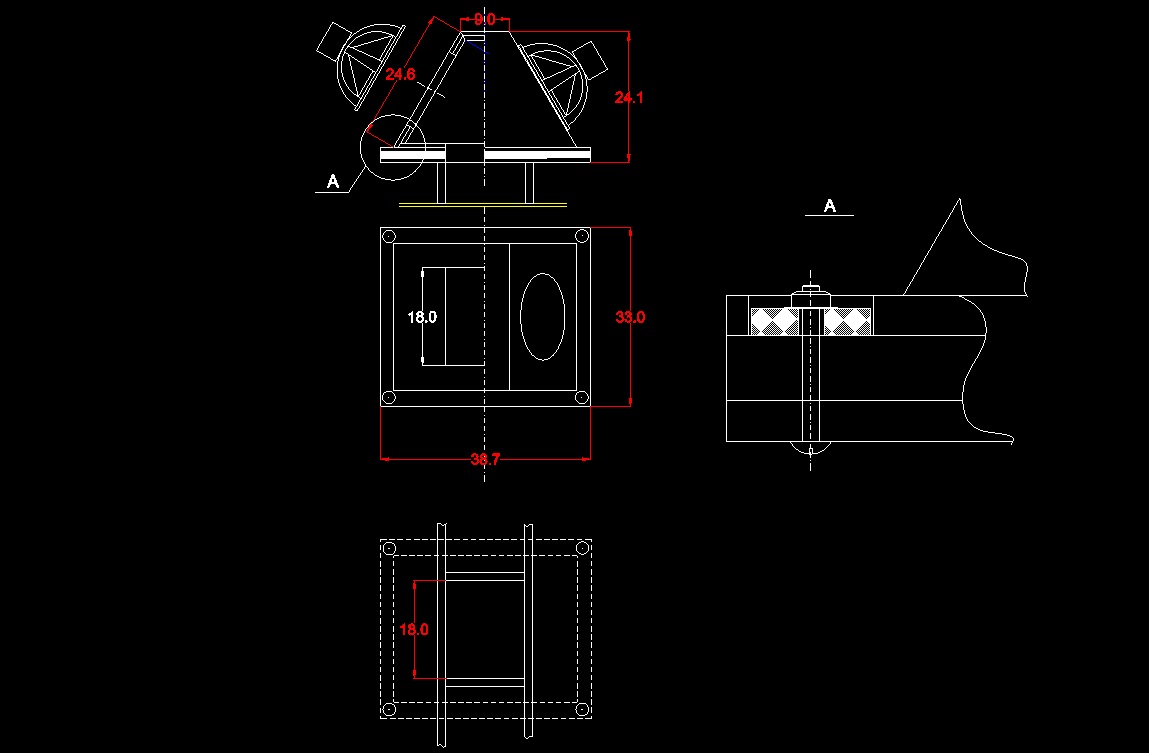
|
|
|
|
Posted by Paul S on
08-07-2018
|
It is not clear to me, when looking at the sectional elevation, are we seeing an "exit hole" that is smaller than the sum of the driver diaphragms?
Paul S
|
|
|
|
Posted by N-set on
08-07-2018
|
How heavy is the structure to be suspended?
|
|
|
|
Posted by Romy the Cat on
08-21-2018
|
|
My contractors who built for me the 40Hz midbass horn in my former
listening room is doing currently my infinite baffle manifold. The deals was changed,
it is not what depicted above and there is no compression chamber in there anymore.
It make with 1.5” Baltic birch and it is heavy like hell. If everything will be
fine then we will be opining the attic next week and begin to cut the joists to
mount the thing in time-aligned position. H, the 4 Aura 18 drivers in that room
with half dropped Fs… it will be interesting. Frankly I do not know what to
expect from sound…
|
|
|
|
Posted by Paul S on
08-21-2018
|
Is it too soon to talk about amps and X/Os, line or speaker level, active or passive, etc? If nothing else, it might save years to use a "board" to establish profiles, especially since the speaker positions will be fixed, and there are (almost) always sum and difference issues.
Paul S
|
|
|
|
Posted by Romy the Cat on
09-03-2018
|
Ok, my carpenter brought today two large manifolds for 4 Aura
drivers and this week will be installing them. Can’t wait how it will end up sounding...
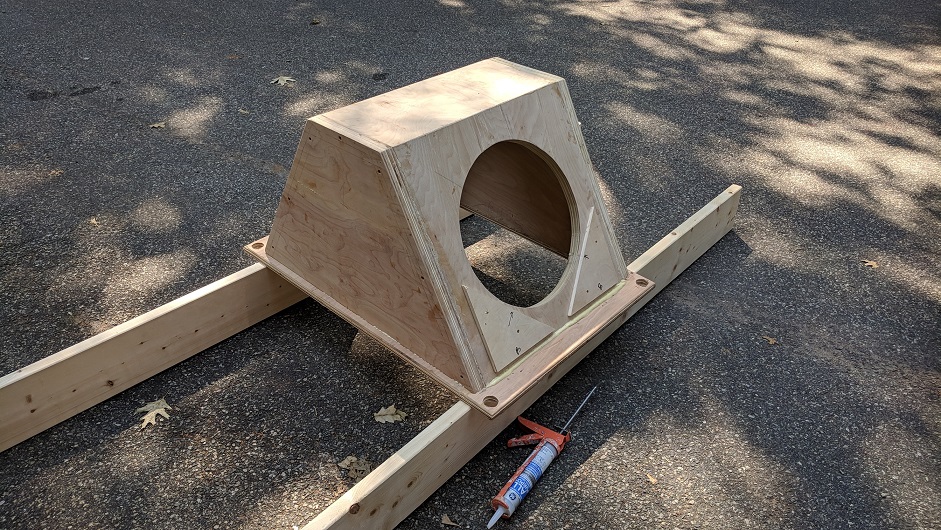
|
|
|
|
Posted by Romy the Cat on
09-06-2018
|
OK, the first assembly is
there. It sits on 3 joists and with the joists are cut,
blocked and warped up. The exit is 30.5 inch by 24 inch. It is 1.5” birth plywood.
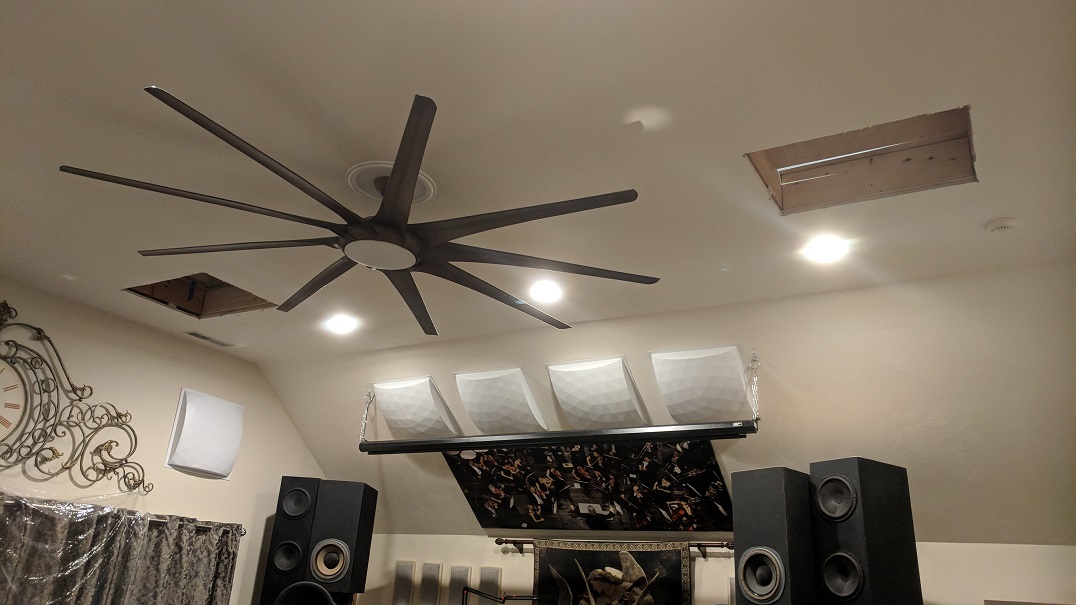
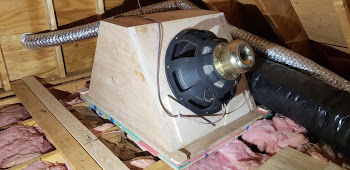
|
|
|
|
Posted by anthony on
09-06-2018
|
|
Although difficult to tell from the photos, they look pretty close to being time aligned too Romy, by the time you allow for the height of the baskets in the ceiling and their overall height above the horn stack relative to your sitting position.
|
|
|
|
Posted by Romy the Cat on
09-07-2018
|
That was a subject of long consideration for me and I ruled
not to go for time alignment. You see, my current listening
position is 8.5 feet from the diaphragms and my ceiling height is 14 foot. Let pretend
that I am siting at 4 feet at my listening chair then it still not enough distance
to get a true time alignment. There are more complications then this. I have
100 inches ceiling fan above me that I would like to keep, I would like do not
have IB exit juts above me, I would like the IB exists were separated between R
and L channels, I would like the IB exists were not in the middle of the room
but rather closer to walls and to be loaded to the walls. And there is another
huge reason: above the ceiling in the attic I have a LOT of things going on. I that’s
the exhaust pipes from bathroom fans, I have center HVAC in there, lightings, security
and a few other systems are running in there and my carpenter spent a LOT of
time to reposition the thing and to clear the space for two manifolds. So, we
end up with 2 locations that are a good compromise to the are equidistant from
my listening position and to be visually agreeable in the room (my listening
position is not symmetrical in the room). So, it is not time aligned. I am planning
to cross it at 20Hz and it will be indirect hitting my listening position, if
we can call “indirect” about pressure wave propagation…
So, in a way it is a compromise and “a bad design” to begin
with but it is what it is. When I divorce my wife and built my next house explicitly
for listening pleasure then I will factor the time
alignment of IB into the room design but for now it will be as is. I wonder if
I will be able to get from IB the overall quality of the sound I was able to
get from the system with midbass horn. I know that IB and midbass horn are different
animals but I am taking about the overall Sound….
|
|
|
|
Posted by Paul S on
09-07-2018
|
My own limited experience with ULF has been that it hasn't been "directional" at all, and hard to say if "time alignment" is even a factor in most cases, apart from the inevitable delays caused by X/Os. Also, where the speakers wound up has been based on overall sound "balance", if we can use that term for the sloppy curves over the bottom octave. It will be educational to learn how Romy deals with the output added by the new ULF speakers interacting with that big room, especially since the speakers are in set positions.
Paul S
|
|
|
|
Posted by Romy the Cat on
09-08-2018
|
OK, the driver in there, connected and my carpenter got his
check. The project is over and I did not even go to the attic – very nice. Now
I need to make it to sound right. It will be longer ceremony and probably will
take a couple weeks. I did concert is as is and drove a SS amp throe it with no
filtration, to assure that everything is in-phase and connected before I went
the carpenter to go. The overall efficiency of this thing is super sensitive –
it sound VERY loud. I cannot comment about sound yet as I did not use any
filters or even phasing. However, there was one moment that I like as lot when
I hear it – the location of the sound was very confused and very not cleared,
and it is despite that I did not use any filters. That was exactly what I want
from this channel - to be very clandestine and not detectable from my listening
position. I am sure it will be much more as I put the filters and integration
with Macondo into the game….
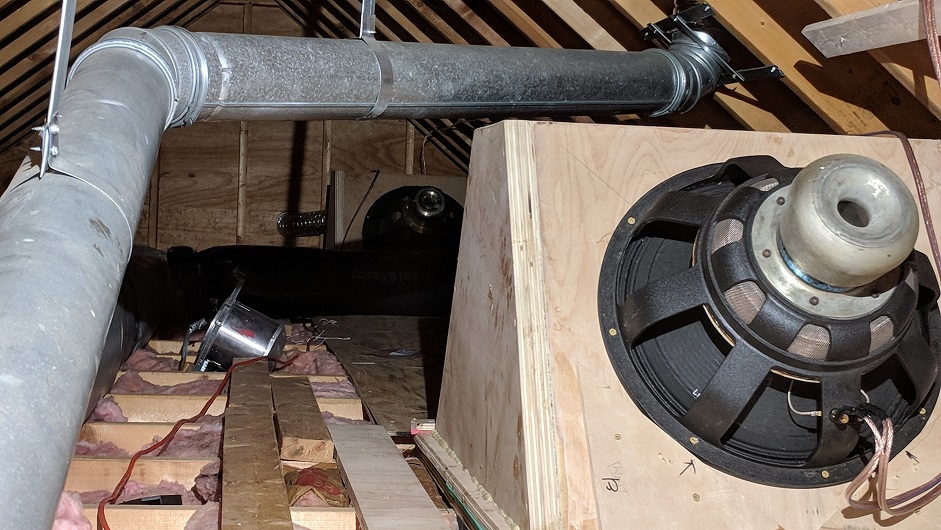
|
|
|
|
Posted by Romy the Cat on
09-11-2018
|
I was sit today to do the calibration of my infinite baffle.
I connected my 20Hz 4th order tube crossover with frond-end modified
Yamaha B-2. The RTA did show a very easy gain exactly where should be, the
transition slope doe the magic. I rolled off approximately 18dB at the amp input to
match the levels. I need to admit that adding even 10dB at the IB channels do
not make it too much auditable. It took some times to do the phase verification:
between the channels and between the main system and IB. Now everything looks
like OK, the pink graph is with IB on.
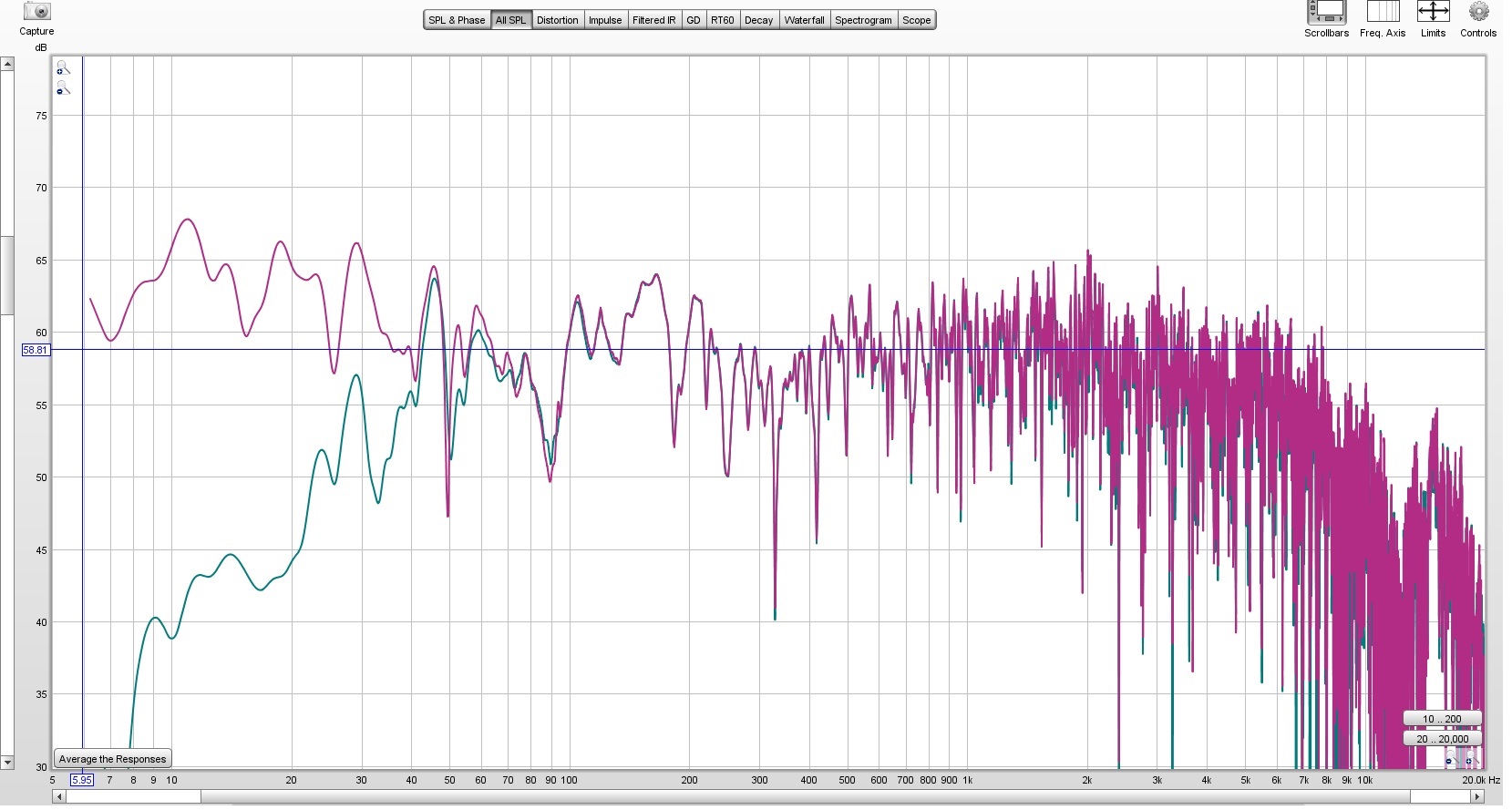
Sound. There is for sure the firmness, the very dense firmness
at the bottom end. The proper things do crash properly-had now. Still, the overall
sound is not what I need. There is no softness of the bottom end, in fact I
feel that it got harder and more dehydrated. It feels like the main system and
the ID runs in opposite phase but they of cause are summing, regardless what in
phase polarity they are in fact in. I need to think why it does not sound properly.
I might rye to soft the ID crossover and to go for 3 or even for the second
order. It should give the softness… as I said I need to think about it.
|
|
|
|
Posted by anthony on
09-11-2018
|
|
That is a lot of output at 6Hz. I hope the Yammies have DC speaker protection because I'd hate a fault in the chain to unleash a heap of DC on those IB's...it may cause a a significant tremor at castle Romy.
|
|
|
|
Posted by Romy the Cat on
09-11-2018
|
|
There is nothing shaking
in here. The roof structure and the things in the attic looks very stable, no foreign
sounds. There is no pressure attack, something that I was afraid. I am a bit
surprised how flat the ULF response I got. It might be the location if the IB
hole turn to be lucky for my room… I think I need to make a sweep of IB with no
crossover and to see how it goes…
|
|